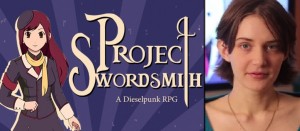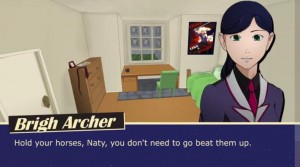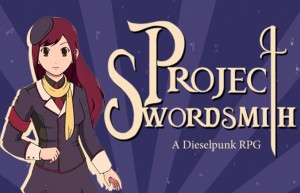 DuCiel Spitzfaden, lead writer and concept artist for Project Swordsmith, took some time out of her schedule to answer some questions from us about her upcoming RPG graphic adventure that’s currently seeking funding through Kickstarter. As we covered previously, Project Swordsmith is a dieselpunk RPG that incorporates WW2 era tech and culture while addressing some weighty societal issues such as equality, discrimination, and peoples’ roles in society.
DuCiel Spitzfaden, lead writer and concept artist for Project Swordsmith, took some time out of her schedule to answer some questions from us about her upcoming RPG graphic adventure that’s currently seeking funding through Kickstarter. As we covered previously, Project Swordsmith is a dieselpunk RPG that incorporates WW2 era tech and culture while addressing some weighty societal issues such as equality, discrimination, and peoples’ roles in society.
[divider]
Cliqist : How would you describe Project Swordsmith to someone?
DuCiel Spitzfaden : We’re calling it a turn-based tactics action RPG. The setting has a mixture of dieselpunk sci fi with superhero fantasy. We’re trying to balance whimsy with more serious and mature undertones and addressing serious topics in a tender way.
Cliqist : On one hand Project Swordsmith is a dieselpunk RPG that advertises intense turn based combat, but it also has the appearance of an Otome game. How do you reconcile these two styles into a single game?
DuCiel : The social elements of the game tie into the combat elements. Interacting with your team members outside of combat and developing your relationships with them will unlock benefits in combat and new information towards the story. It’s a roleplaying game, so you play through the characters’ lives, both in and outside of combat. The gameplay outside of combat will hold its own challenges.
 Cliqist : Visual novel games are not something on most “hardcore” gamers radars. Are they missing out?
Cliqist : Visual novel games are not something on most “hardcore” gamers radars. Are they missing out?
DuCiel : I don’t think every type of person should play every type of game, but I am personally a big fan of good stories, whether they’re in the format of a book, movie, or video game. For people who also appreciate good stories, then yes, I would say they should look into the genre. People who are into gaming only for the thrill of hand-eye coordination challenge may not enjoy them, which is fine too.
Cliqist : Have you received any criticisms from the visual novel / Otome crowd for integrating traditional combat into Project Swordsmith?
DuCiel : So far, no, not yet. It seems like we’re getting the most criticism from people who don’t understand what we’re doing. Not that everyone who does understand should automatically like it, but so far the biggest complaints we’ve had have been that it wasn’t clear what we were doing. Meanwhile the biggest compliments have been people saying they really get what we’re trying to do and are excited to see how it will turn out. I think this early on, our biggest problem may be that we don’t have enough gameplay to show to get people to really understand what we’re going for without reading through our entire Kickstarter page.
 Cliqist : Project Swordsmith deals with some weighty issues like stereotypes, discrimination, and war. What inspired that?
Cliqist : Project Swordsmith deals with some weighty issues like stereotypes, discrimination, and war. What inspired that?
DuCiel : It’s always something I’ve been interested in. There are a host of novels and films that address topics like these in extremely moving ways. I feel that video games have the potential to do the same, perhaps even more so by putting the player in the position of the character.
Yet in video games, characters who are not white, straight, and male tend to be either token characters or overlooked entirely. Of course, that’s not always the case, and I was inspired by games that included a wider variety of character types and did it well. Project Swordsmith isn’t intended to be guilt-trippy or preachy. It’s only meant to provide a wider variety of players with characters they can relate to and subject matter that might inspire some thought.
 Cliqist : What’s the thing people will like most about Project Swordsmith?
Cliqist : What’s the thing people will like most about Project Swordsmith?
DuCiel : I think it depends on the person. Even in our very small development team, each person likes a different aspect the most. Some people who like JRPGs will probably enjoy the combat, both for the classic JRPG elements and for the freshness we’ve added to make it more exciting. Personally, the thing that I would most enjoy about it as a player would be the ability to affect the story by making choices and developing relationships with characters. That and a story that’s intelligent and meaningful, and hopefully inspiring.
Cliqist : What’s it like working on a team with your husband?
DuCiel : It’s really wonderful. We share a deep love of creativity, which is the reason we love each other. Working together is our favorite pastime. On our honeymoon we were really excited to get away from all the stress of wedding planning and guests and just write and draw and plan together.
Cliqist : Did you do anything special to prepare for your Kickstarter? Any hard learned lessons yet?
DuCiel : We worked to get as much of the game done as we could in advance and didn’t prepare very much for the details of the Kickstarter at all. I think it would have been a good idea to have hyped up the Kickstarter in advance and developed an audience who was ready to pledge. It also would have been good to have a bit more art to spruce up the page and get people interested. But we’re just going to keep on working with what we have and developing new audience and new art as we go.
Cliqist : Any final comments or thoughts you’d like to share?
DuCiel : I can’t say that I recommend the game for all players, but for anyone who likes an emphasis on character development, anyone who used to love JRPGs, but hasn’t seen an interesting one in a long time, and anyone who wants games to be a powerful storytelling tool in their own right instead of trying to be just books or films with some extra whistles, I’d recommend you give it a chance.
Cliqist : Can you close us out with a Project Swordsmith inspired Haiku?
DuCiel : I could give it a try… Anyway, here goes!
The tree’s falling leaf
is no different than you
Here for a moment
^_^;; I might have gotten too caught up in juxtaposition and symbols of seasons to say too much, but I tried!
[divider]Thanks to DuCiel Spitzfaden for taking the time to answer our questions, and bust out a little poetry in the process! Take some time and check out the Project Swordsmith Kickstarter campaign, which is running until November 16th.



